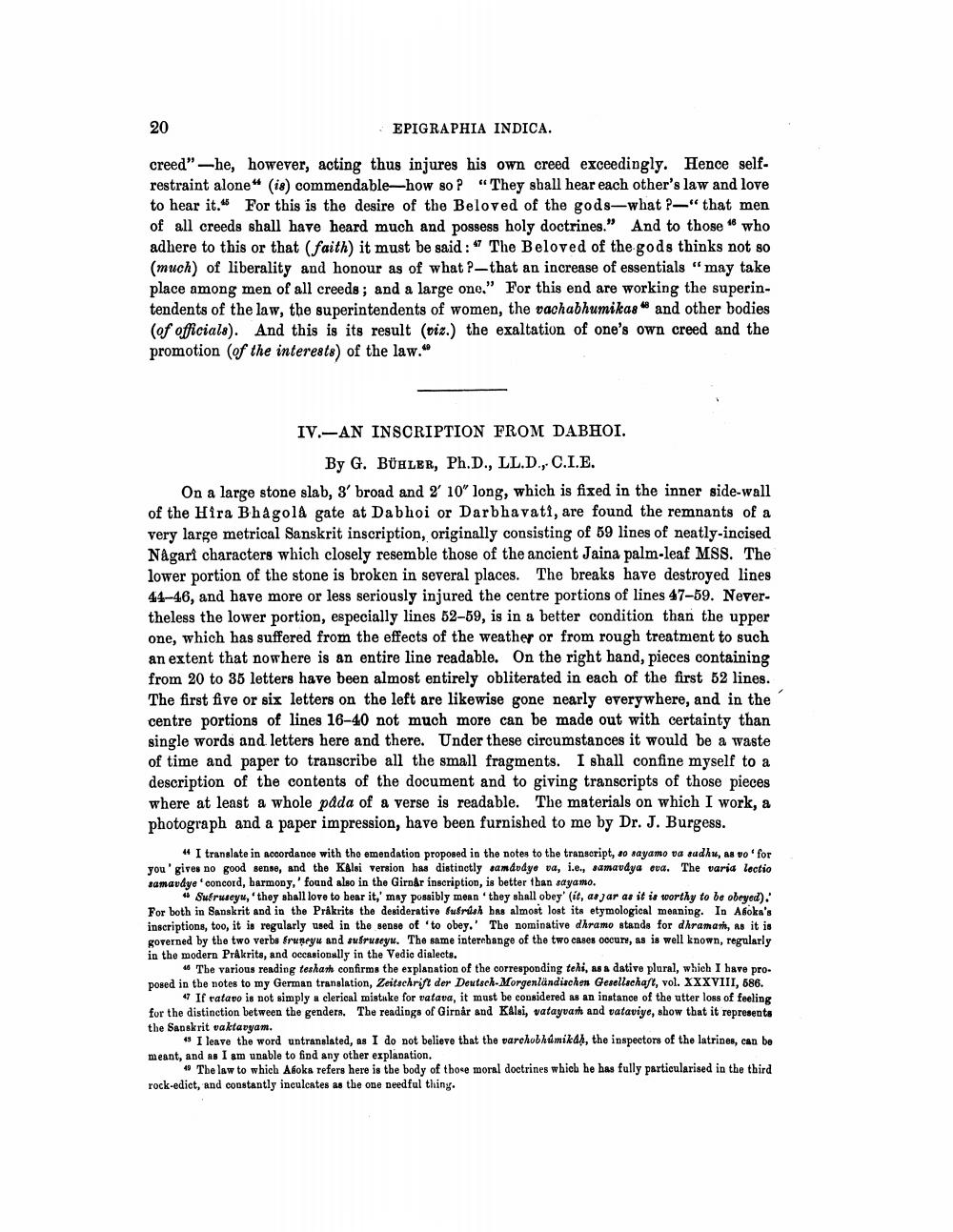________________
20
EPIGRAPHIA INDICA.
creed"-he, however, acting thus injures his own creed exceedingly. Hence selfrestraint alone" (is) commendable-how so? "They shall hear each other's law and love to hear it. For this is the desire of the Beloved of the gods-what?" that men of all creeds shall have heard much and possess holy doctrines." And to those who adhere to this or that (faith) it must be said: " The Beloved of the gods thinks not so (much) of liberality and honour as of what ?-that an increase of essentials "may take place among men of all creeds; and a large one." For this end are working the superintendents of the law, the superintendents of women, the vachabhumikas and other bodies (of officials). And this is its result (viz.) the exaltation of one's own creed and the promotion (of the interests) of the law."
IV. AN INSCRIPTION FROM DABHOI.
By G. BÜHLER, Ph.D., LL.D., C.I.E.
On a large stone slab, 3' broad and 2' 10" long, which is fixed in the inner side-wall of the Hira Bhagola gate at Dabhoi or Darbhavati, are found the remnants of a very large metrical Sanskrit inscription, originally consisting of 59 lines of neatly-incised Nagari characters which closely resemble those of the ancient Jaina palm-leaf MSS. The lower portion of the stone is broken in several places. The breaks have destroyed lines 44-46, and have more or less seriously injured the centre portions of lines 47-59. Nevertheless the lower portion, especially lines 52-59, is in a better condition than the upper one, which has suffered from the effects of the weather or from rough treatment to such an extent that nowhere is an entire line readable. On the right hand, pieces containing from 20 to 35 letters have been almost entirely obliterated in each of the first 52 lines. The first five or six letters on the left are likewise gone nearly everywhere, and in the centre portions of lines 16-40 not much more can be made out with certainty than single words and letters here and there. Under these circumstances it would be a waste of time and paper to transcribe all the small fragments. I shall confine myself to a description of the contents of the document and to giving transcripts of those pieces where at least a whole pada of a verse is readable. The materials on which I work, a photograph and a paper impression, have been furnished to me by Dr. J. Burgess.
44 I translate in accordance with the emendation proposed in the notes to the transcript, so sayamo va sudhu, as vo 'for you' gives no good sense, and the Kalsi version has distinctly samdvdye va, i.e., samavaya eva. The varia lectio samavdye concord, harmony,' found also in the Girnår inscription, is better than sayamo.
Suruseyu, they shall love to hear it,' may possibly mean they shall obey' (it, as jar as it is worthy to be obeyed). For both in Sanskrit and in the Prakrits the desiderative fuérish has almost lost its etymological meaning. In Asoka's inscriptions, too, it is regularly used in the sense of 'to obey.' The nominative dhramo stands for dhramam, as it is governed by the two verbs fruneyu and sufruseyu. The same interchange of the two cases occurs, as is well known, regularly in the modern Prakrits, and occasionally in the Vedic dialects.
The various reading tesham confirms the explanation of the corresponding tehi, as a dative plural, which I have proposed in the notes to my German translation, Zeitschrift der Deutsch-Morgenländischen Gesellschaft, vol. XXXVIII, 586. 47 If ratavo is not simply a clerical mistake for vatava, it must be considered as an instance of the utter loss of feeling for the distinction between the genders. The readings of Girnår and Kalsi, vatayvam and vataviye, show that it represents the Sanskrit vaktavyam.
49 I leave the word untranslated, as I do not believe that the varchobhumikaḥ, the inspectors of the latrines, can be meant, and as I am unable to find any other explanation.
49 The law to which Asoka refers here is the body of those moral doctrines which he has fully particularised in the third rock-edict, and constantly inculcates as the one needful thing.




